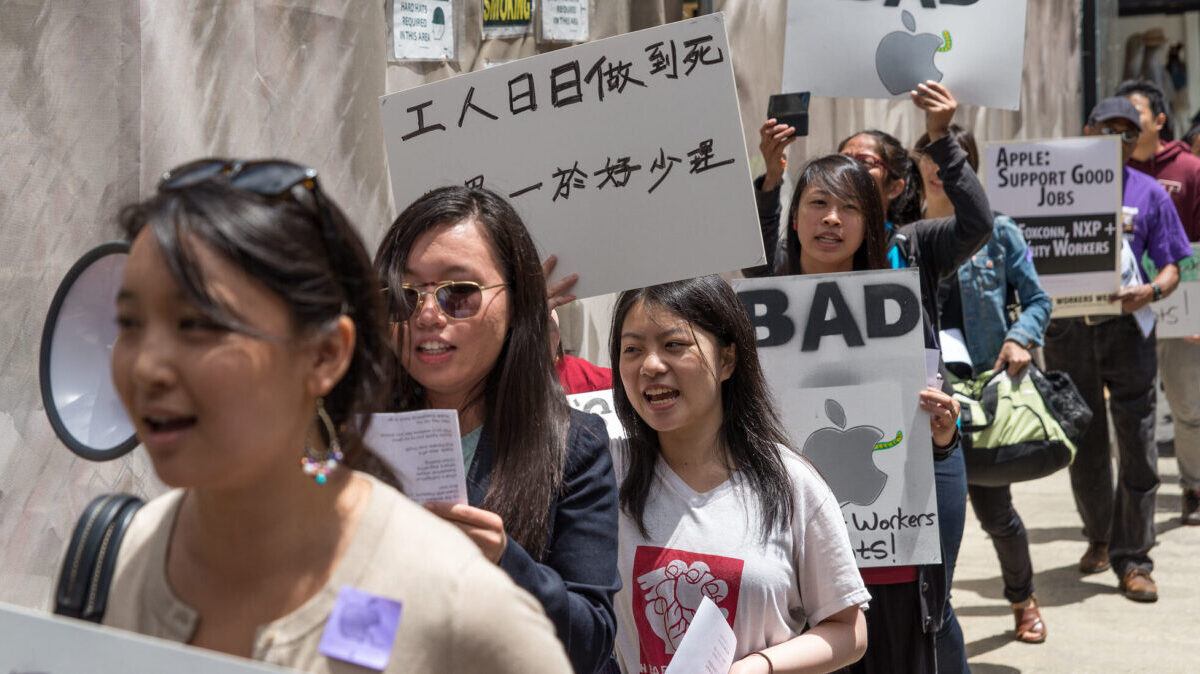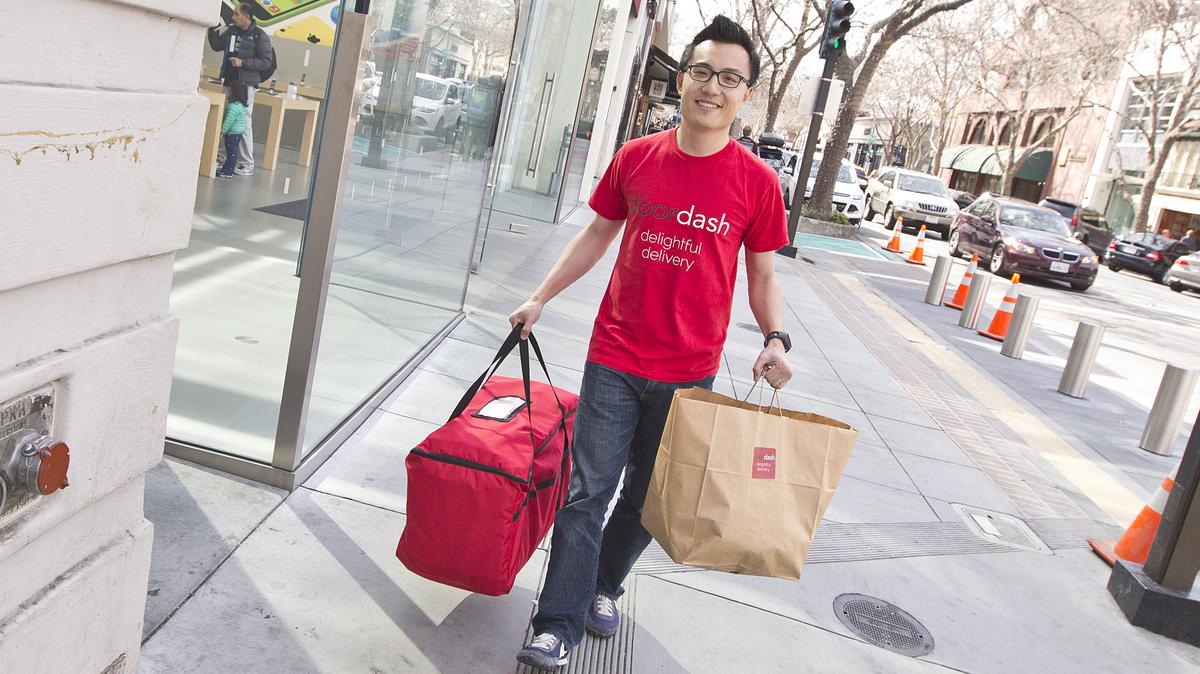Few American CEOs have kowtowed to the Chinese Communist Party (CCP) as much as Apple’s Tim Cook. But Cook’s bet on China, often at considerable reputational risk for him and his company, got a harsh reality check after Beijing recently banned state employees from using foreign-branded smartphones, including the iPhone.
For years, the CCP welcomed Apple because the company brought badly needed technical know-how, investment, and hundreds of thousands of jobs to China. The party rolled out the red carpet for Cook. He was often received by the CCP’s top leadership and frequently spoke at Chinese government-sponsored conferences, where he lavishly sang Beijing’s praises.
Clearly, Cook has tried to be on the CCP’s good side due to China’s critical role in Apple’s bottom line. According to Reuters, China accounts for nearly 20 percent of Apple’s annual revenue, or about $80 billion. China is also Apple’s most critical manufacturer hub; almost 50 percent of Apple suppliers are based in the country as of 2019.
In the U.S., Cook has promoted Apple as a responsible corporate citizen and unequivocal defender of democracy and social justice. In 2016, Apple fought a legal battle to deny the FBI’s request to help the agency break into the iPhone used by San Bernardino shooter Syed Farook (he and his wife murdered 14 people in December 2015). Cook reportedly called the government’s request a threat to customers’ privacy and security, and “the software equivalent of cancer.” He even threatened to resign if Apple didn’t fight the FBI’s request.
Three years later, citing similar concerns, Apple again refused to help the Trump administration’s Department of Justice unlock two iPhones used by Mohammed Saeed Alshamrani, an al-Qaeda-linked terrorist who killed three people and injured several others at a naval base in Pensacola, Florida, in 2019.
Apple Abandoned Its Values in China
But in China, driven by profit and prestige, Apple often abandoned the values it proclaimed to cherish and eagerly kowtowed to the CCP’s demands. When the Chinese authorities requested access to Apple user data in 2018, Apple didn’t resist, nor did Cook threaten to resign. Instead, the company moved iCloud accounts registered in mainland China, along with the digital keys needed to unlock them, to servers run by Guizhou-Cloud Big Data (GCBD), an entity owned by the government of Guizhou province. Apple justified its action by insisting it was to comply with China’s controversial cybersecurity law. However, rights groups criticized the company for assisting an authoritarian regime in surveilling and suppressing political dissenters in mainland China.
Similarly, in 2019, Apple tried to appease the CCP by removing a popular app used by Hong Kong pro-democracy protesters to locate police and demonstrations. The company only reinstalled the app after widespread backlash, including letters from Sen. Ted Cruz, R-Texas, and Rep. Alexandria Ocasio-Cortez, D-N.Y. Still, Apple has removed from its app store thousands of other apps that the Chinese government deemed illegal, including virtual private networks, or VPNs, which allow users to bypass China’s internet firewall.
A 2020 report by the Australian Strategic Policy Institute found that thousands of Uyghur Muslims were forced laborers working for at least a dozen Apple contractors, including O-Film, an Apple contractor Cook visited in 2017 and praised for its “humane approach towards employees.” The revelation that Apple relied on slave laborers in China came after Cook announced his company would put up $100 million to fight for racial justice, not in China but in the U.S.
Apple has been widely criticized for its “one company, two systems” hypocrisy. Some also warned that the company’s overreliance on China’s market and supply chains and growing Sino-U.S. tensions mean the company’s business model is unsustainable and would eventually damage Apple’s bottom line. History has also shown that an authoritarian regime such as the CCP is not a reliable partner. The party knows how to deploy a charm offensive when it needs something (be it technology or capital) from foreign companies like Apple. But once the party is done with them, it will not hesitate to use them as pawns and sacrifice them to score geopolitical and economic points.
Apple should have been alarmed last year, as protests broke out at the world’s largest iPhone factory in Zhengzhou, China, due to dissatisfaction with the Chinese government’s strict “zero Covid” protocol and poor living conditions inside the factory. The Chinese government sent police to crack down on protesters. The incident and delay in production likely cost Apple a shortfall of 6 million of its flagship iPhone 14 and 14 Plus right around the holiday season.
New Phone Ban
If China’s “zero Covid” policy gave Apple a black eye, Beijing’s iPhone ban was a gut punch to the company. According to The Wall Street Journal, China has about 56 million state employees as of 2012, and they are more affluent than average because they “commanded an average wage about 8% above the national urban average.” And “because Apple now ships roughly 230 million iPhones globally every year, 56 million would be a notable chunk to take out of the pool of potential buyers — especially in a mature global smartphone market with low growth prospects.”
Beijing claimed the iPhone ban was necessary to enhance cybersecurity and prevent sensitive data from leaving China. But interestingly, Beijing’s iPhone ban came around the time that China’s telecom giant Huawei released a new phone with 5G-like speeds and capabilities. One analyst estimates that between the iPhone ban and Huawei’s latest phone release, Apple could lose 10 million iPhone shipments in 2024. It is highly possible that Beijing’s iPhone ban and the timing of the announcement were also designed to fulfill party leader Xi Jinping’s desire to achieve self-reliance in technical know-how and to support Huawei, a Chinese company with close military and government ties, at Apple’s expense.
Reuters estimated that Beijing’s ban might cost Apple $19 billion in revenue, or almost $7 billion in profit. Apple investors didn’t take this news lightly. Apple’s stock price dropped close to 7 percent in two days and wiped out nearly $194 million of the company’s market value. The reckoning of Cook’s bet on China has finally arrived. It is worth asking whether Apple’s kowtowing to the CCP was all worth it.
Apple’s changing fortune in China should be a dire warning to other American companies still investing in the country without a decoupling plan. As The Wall Street Journal pointed out, “few companies are safe if Apple isn’t immune to China’s retaliation.” Given China’s growing repression and deteriorating relations with the U.S., American companies must proactively plan alternatives to China’s supply chains and the Chinese market.









